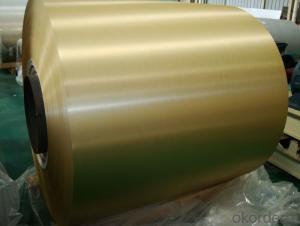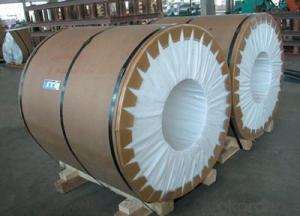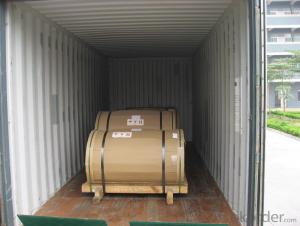Aluminium Roll Coating for Decoration Innner and Outside
- Loading Port:
- Shanghai
- Payment Terms:
- TT OR LC
- Min Order Qty:
- 5 m.t.
- Supply Capability:
- 2000 m.t./month
OKorder Service Pledge
OKorder Financial Service
You Might Also Like
Item specifice
Structure of Aluminium Roll Coating for Decoration Innner and Outside Description:
Coated aluminum coil/sheet are of a wide range of colors, which gives wonderful appearance no matter in residential and commercial constructions of great exhibition centers.
The coated aluminum coil/sheet have been widely used in the fields of construction and decoration( garage doors, ceiling etc.), electronic appliances, lighting decoration, air-condition air pipes, sandwich panels and drainages etc.
Main Features of the Aluminium Roll Coating for Decoration Innner and Outside:
1) High flexibility
2) Impact resistance
3) Excellent weather-proof durability
4) Anti-ultraviolet
5) High erosion resist
Images of the Aluminium Roll Coating for Decoration Innner and Outside:
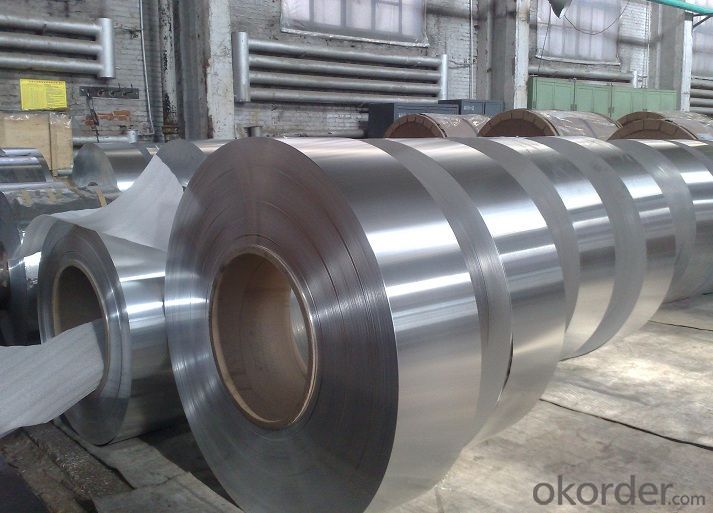
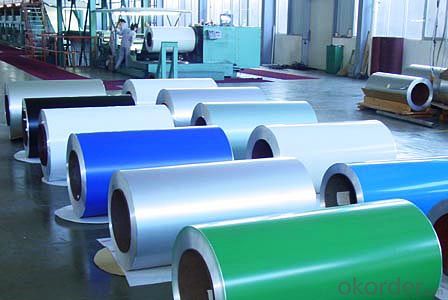
Aluminium Roll Coating for Decoration Innner and Outside Specification:
Alloy | A1100,A3003,A1050,A8011 etc |
Temper | H16,H18,H24 |
Thickness | From 0.024mm to 1.2mm |
Width | Standard width:1240mm |
Special width:1300mm,1520mm,1570mm,1595mm | |
Diameter | Standard dia:1200mm |
Interior dia:150mm,405mm,505mm | |
Weight | 2.5 T/coil,3.0 T/coil |
Coating | PE, PVDF, AC |
Surface | Embossed, mill finish, coated |
Color | AS to code RAL |
Gloss | 10-90%(EN ISO-2813:1994) |
Coating Thickness | PE: more than 18 micron |
PVDF: more than 25 micron | |
Coating Hardness (pencil resistance) | More than 2h |
Coating adhesion | 5J(EN ISO-2409:1994) |
Impact Resistance | No peeling or cracking(50 kg/cm,ASTMD-2794:1993) |
Flexibility (T-bend) | 2T |
MEK resistance | More than 100 |
FAQ:
a.What is monthly capacity
---CNBM is one stated own company and our monthly capacity is about 2000tons.
b. Now which countries do you export your goods?
---Now we export to South East Asia,Africa, North America,South America ect.
- Q:Can aluminum coils be used for heat dissipation purposes?
- Yes, aluminum coils can be effectively used for heat dissipation purposes. Aluminum is an excellent conductor of heat, with high thermal conductivity and low thermal resistance. This makes it an ideal material for transferring heat away from a source and dissipating it into the surrounding environment. Aluminum coils are commonly used in various applications such as refrigeration, air conditioning, radiator systems, and heat exchangers. The coils are designed to maximize the surface area available for heat transfer, allowing for efficient cooling and dissipation of heat. Additionally, aluminum is lightweight and corrosion-resistant, making it a practical choice for heat dissipation in various industries. Overall, aluminum coils are a reliable and efficient solution for heat dissipation purposes.
- Q:Can aluminum coils be used in the construction industry?
- Yes, aluminum coils can be used in the construction industry. Aluminum is a versatile and lightweight material that offers several advantages for construction applications. Aluminum coils are commonly used in the construction industry for various purposes, such as roofing, siding, gutters, and fascia. One of the main benefits of using aluminum coils in construction is its corrosion resistance. Aluminum naturally forms a protective oxide layer on its surface, which prevents rust and corrosion. This makes it highly suitable for exterior applications, where exposure to moisture and weather elements is common. Additionally, aluminum coils are easy to shape and work with, making them ideal for creating custom components and structures. They can be easily cut, bent, and formed into different shapes, allowing for flexibility and creativity in construction projects. Another advantage of aluminum coils is their lightweight nature. Aluminum is significantly lighter than other metals like steel, making it easier to handle and transport. This can reduce construction costs and make installation processes more efficient. Furthermore, aluminum is a sustainable and environmentally-friendly material. It is 100% recyclable and can be reprocessed repeatedly without losing its properties. This makes aluminum coils an eco-friendly choice for construction projects. In conclusion, aluminum coils are widely used in the construction industry due to their corrosion resistance, flexibility, lightweight nature, and sustainability. They offer numerous advantages for various applications and contribute to the overall efficiency and durability of construction projects.
- Q:How are aluminum coils used in electrical applications?
- Due to their advantageous properties, aluminum coils find wide application in various electrical uses. Transformers, motors, and inductors are the primary domains where these coils are employed. Transformers utilize aluminum coils to facilitate the transfer of electrical energy from one circuit to another. These coils are wrapped around a magnetic core, thereby facilitating efficient energy transfer. Aluminum coils are preferred over copper coils in transformers due to their affordability, light weight, and superior conductivity. Moreover, aluminum coils exhibit higher thermal conductivity, enabling better heat dissipation. This feature is crucial for maintaining transformer efficiency and longevity. In motors, aluminum coils serve as the winding material for the stator, which is the stationary component of the motor. By passing an electrical current through the coils, a magnetic field is generated. This magnetic field interacts with the rotating magnetic field produced by the motor's rotor, resulting in motor rotation. Aluminum coils are favored in motors due to their lightweight nature, contributing to overall motor efficiency by reducing its weight. Inductors, another electrical component, employ aluminum coils. Inductors store electrical energy in the form of a magnetic field. When an electric current traverses the coil, a magnetic field is generated, which opposes changes in the current. Aluminum coils are utilized in inductors owing to their high electrical conductivity, facilitating efficient energy storage and release. In summary, aluminum coils are extensively used in electrical applications due to their cost-effectiveness, lightweight nature, excellent conductivity, and high thermal conductivity. Their application in transformers, motors, and inductors plays a pivotal role in ensuring efficient and reliable operation of electrical systems.
- Q:How do aluminum coils contribute to energy efficiency in buildings?
- The use of aluminum coils is crucial for improving energy efficiency in buildings. To begin with, aluminum is an extremely conductive material, allowing for efficient heat transfer. This characteristic is particularly important in HVAC systems, where aluminum coils are commonly employed. These coils aid in the transfer of heat between the indoor and outdoor units, enabling effective temperature regulation and decreasing energy usage. Furthermore, aluminum coils are lightweight, making them easier to handle and install. This not only saves time and labor costs but also reduces the overall weight of the HVAC system, resulting in lower energy requirements for operation. Additionally, the lightweight nature of aluminum coils allows for the creation of compact systems, conserving valuable space in buildings. Additionally, aluminum is highly resistant to corrosion, ensuring the long-lasting and durable nature of the coils. This resistance to corrosion is especially vital in areas with high humidity or exposure to harsh weather conditions. By maintaining their effectiveness over time, aluminum coils minimize the need for frequent replacements, thereby reducing energy consumption associated with the manufacturing and installation processes. Another significant advantage of aluminum coils is their recyclability. Aluminum is one of the most widely recycled materials globally, with a high recycling rate and minimal loss of quality during the process. By utilizing aluminum coils, buildings contribute to a more sustainable and environmentally-friendly approach, as the material can be recycled repeatedly without compromising its performance. Moreover, the recycling process requires significantly less energy compared to primary aluminum production, resulting in reduced greenhouse gas emissions. In conclusion, aluminum coils play a crucial role in enhancing the energy efficiency of buildings through their high conductivity, lightweight nature, corrosion resistance, and recyclability. By facilitating efficient heat transfer, reducing energy consumption, and promoting sustainability, aluminum coils play a vital role in improving the energy efficiency of HVAC systems and overall building performance.
- Q:Can aluminum coils withstand extreme temperatures?
- Yes, aluminum coils are known for their ability to withstand extreme temperatures. Aluminum has a high melting point of 660.32°C (1220.58°F), which makes it ideal for use in applications that require resistance to heat. Aluminum coils are commonly used in HVAC systems, where they are exposed to both high and low temperatures. They are also used in automotive radiators, where they must endure high operating temperatures. Additionally, aluminum has excellent thermal conductivity, which allows it to efficiently transfer heat away from the coil, further enhancing its ability to withstand extreme temperatures. Overall, aluminum coils are a reliable and durable choice for applications that require resistance to extreme temperatures.
- Q:Can aluminum coils be used in extreme temperature conditions?
- Yes, aluminum coils can be used in extreme temperature conditions. Aluminum has a high melting point of 660.32°C (1220.58°F) and can withstand extreme heat without deforming or melting. Additionally, aluminum has excellent thermal conductivity, allowing it to quickly transfer heat away from the coil. This makes it suitable for various applications, including air conditioning, refrigeration, and heating systems that may encounter extreme temperature conditions. Moreover, aluminum coils are lightweight and corrosion-resistant, making them a preferred choice in many industries.
- Q:Are aluminum coils suitable for food packaging?
- Food packaging can indeed utilize aluminum coils. Aluminum is extensively employed in the food packaging sector because of its various advantageous characteristics. To start off, aluminum serves as a non-toxic and non-reactive substance, ensuring that harmful substances do not leach into the food. Moreover, it acts as an impermeable barrier to gases and moisture, effectively safeguarding the food from oxygen, light, and moisture that could spoil its quality or alter its taste. In addition, aluminum coils are lightweight, facilitating their transportation and handling. They are also highly malleable, enabling them to be easily shaped and formed into various packaging designs. Additionally, aluminum's heat conductivity properties are commendable, allowing for efficient heat transfer during food processing or cooking. Finally, aluminum demonstrates its commitment to the environment as a sustainable and recyclable material, making it an eco-friendly choice for food packaging. Overall, due to its safety, barrier properties, lightweight nature, flexibility, heat conduction capabilities, and sustainability, aluminum coils are a suitable and widely embraced option for food packaging.
- Q:What are the different tensile strengths of aluminum coils?
- The tensile strength of aluminum coils can vary depending on the specific alloy and temper of the aluminum used. Aluminum alloys commonly used for coils include 1100, 3003, 5052, and 6061. The tensile strength of these alloys can range from approximately 13,000 psi (90 MPa) for 1100 aluminum to around 45,000 psi (310 MPa) for 6061 aluminum. The temper of the aluminum also plays a significant role in determining its tensile strength. The most common temper for aluminum coils is H14, which means the material has been strain-hardened and partially annealed to achieve a balance of strength and formability. Other tempers such as H18, H24, and H32 can result in higher tensile strengths, whereas softer tempers like O (annealed) or H12 can have lower tensile strengths. It is important to note that these values are general ranges and can vary slightly depending on the specific manufacturer and production process. Additionally, factors such as thickness, width, and surface treatment of the aluminum coils can also influence their tensile strength. Therefore, it is recommended to consult the manufacturer's specifications or test the specific aluminum coil to accurately determine its tensile strength.
- Q:Can aluminum coils be used for window frames?
- Certainly, window frames can indeed be made using aluminum coils. Aluminum is widely favored for window frames owing to its enduring nature, lightweight composition, and ability to resist corrosion. It is extensively employed in both residential and commercial settings. Aluminum coils can be effortlessly molded and adjusted to accommodate diverse window dimensions and designs. Additionally, aluminum frames provide exceptional thermal insulation qualities, thereby enhancing energy efficiency in structures. All in all, aluminum coils represent a dependable and pragmatic choice for constructing window frames.
- Q:How are aluminum coils protected against UV degradation?
- Aluminum coils are often safeguarded against UV degradation by applying protective coatings or treatments, which act as a barrier between the aluminum surface and harmful UV rays from the sun. These protective coatings, like polyvinylidene fluoride (PVDF) or polyester coatings, are specifically formulated to resist UV radiation and create a durable layer that shields the aluminum coil from prolonged sun exposure. Another method of protection is anodizing, an electrochemical process that creates a protective oxide layer on the aluminum surface. This oxide layer acts as a barrier against UV rays, preventing them from reaching the underlying metal. Anodized aluminum coils are well-known for their excellent resistance to UV degradation and are commonly used in outdoor applications that require long-lasting durability. In addition to these coatings and treatments, aluminum coils can be designed with specific alloy compositions that enhance their resistance to UV degradation. Incorporating certain alloy elements like magnesium and manganese can improve the natural ability of aluminum to withstand UV radiation, increasing the overall durability and UV resistance of the coil. In conclusion, protecting aluminum coils against UV degradation is crucial when they are exposed to sunlight. By utilizing protective coatings, anodizing, or selecting appropriate alloy compositions, manufacturers can effectively safeguard the coils, ensuring their long-term performance and durability even in challenging outdoor environments.
1. Manufacturer Overview |
|
|---|---|
| Location | |
| Year Established | |
| Annual Output Value | |
| Main Markets | |
| Company Certifications | |
2. Manufacturer Certificates |
|
|---|---|
| a) Certification Name | |
| Range | |
| Reference | |
| Validity Period | |
3. Manufacturer Capability |
|
|---|---|
| a)Trade Capacity | |
| Nearest Port | |
| Export Percentage | |
| No.of Employees in Trade Department | |
| Language Spoken: | |
| b)Factory Information | |
| Factory Size: | |
| No. of Production Lines | |
| Contract Manufacturing | |
| Product Price Range | |
Send your message to us
Aluminium Roll Coating for Decoration Innner and Outside
- Loading Port:
- Shanghai
- Payment Terms:
- TT OR LC
- Min Order Qty:
- 5 m.t.
- Supply Capability:
- 2000 m.t./month
OKorder Service Pledge
OKorder Financial Service
Similar products
New products
Hot products
Related keywords
